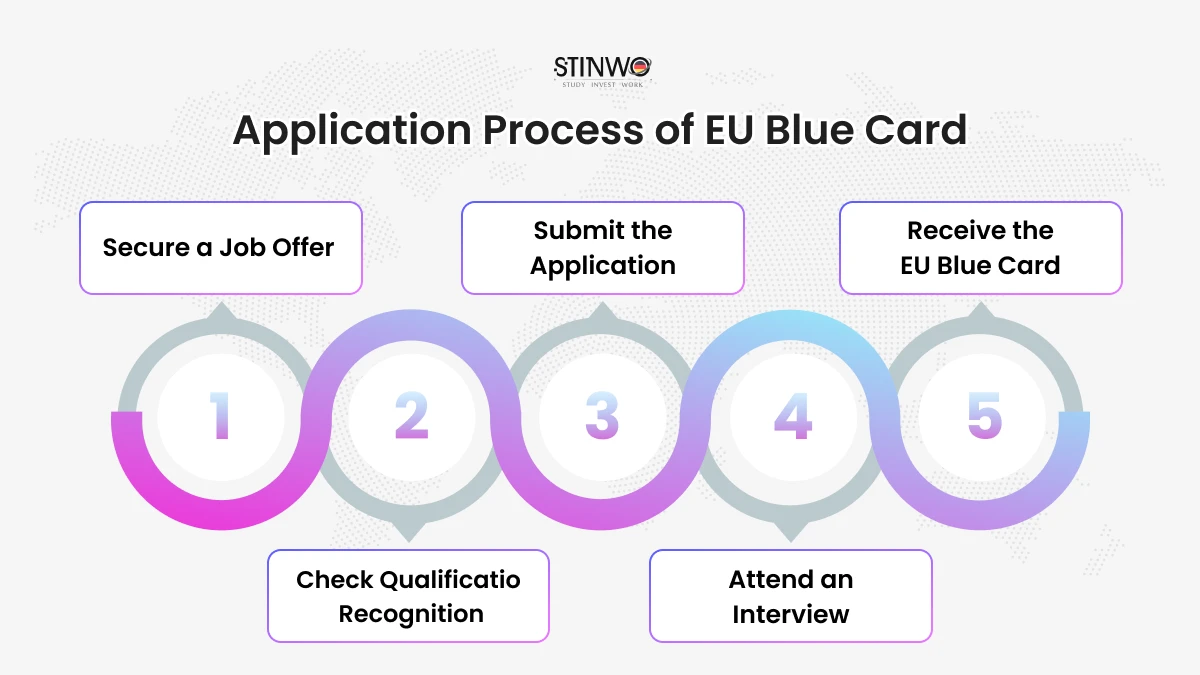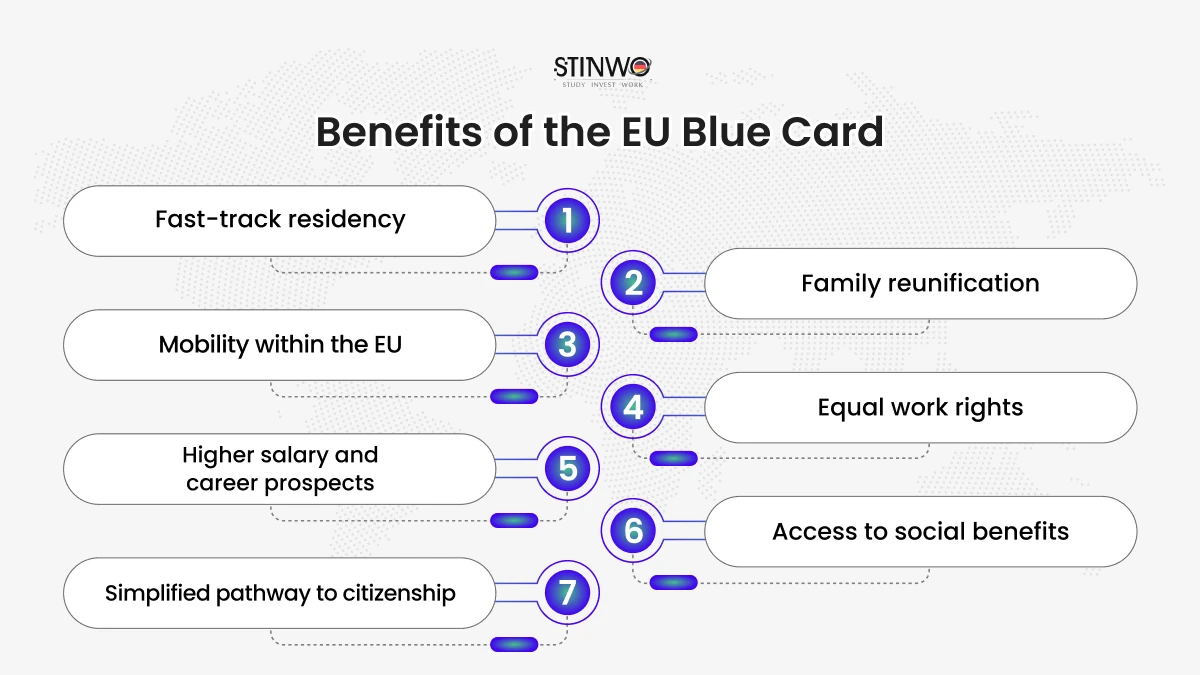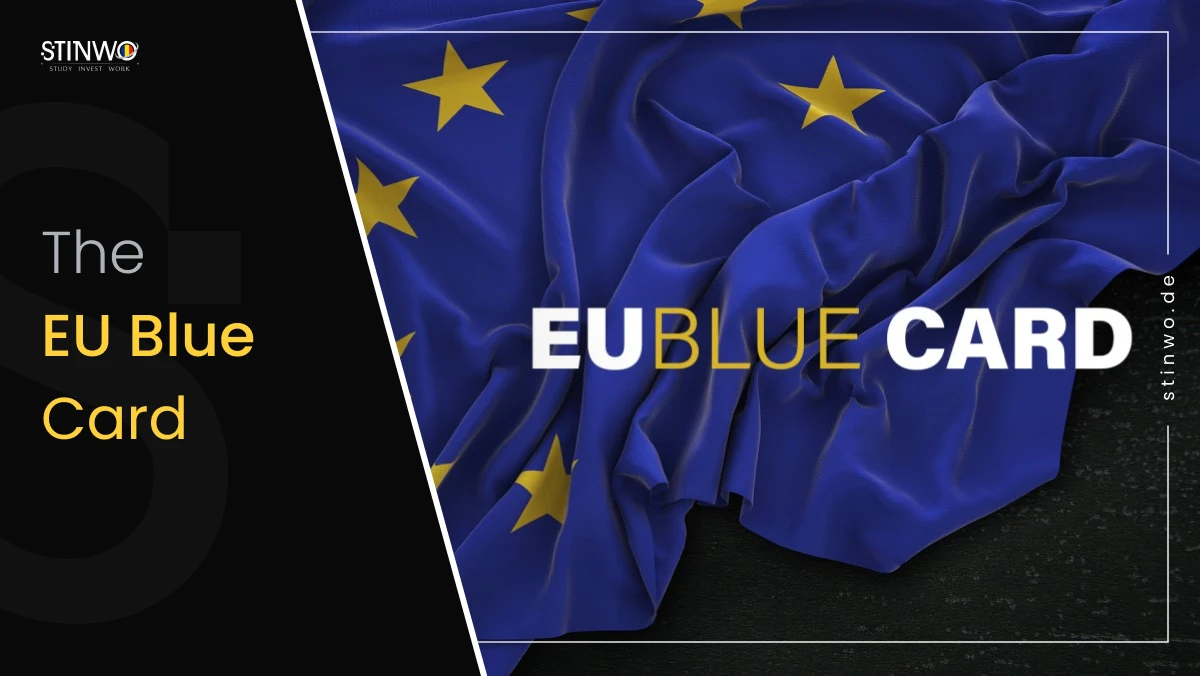Since its inception on August 1, 2012, the EU Blue Card has provided a significant pathway for skilled employees and university graduates to secure a residence permit in Germany. This initiative is designed to enhance and simplify the process for highly qualified professionals from outside the EU seeking to establish themselves in Germany. The framework governing eligibility for residing and working in Germany under the EU Blue Card is outlined in Section 18g of the Residence Act, ensuring a clear legal pathway for prospective immigrants.
What is the EU Blue Card?
The EU Blue Card is a specialized residence permit designed to attract highly skilled professionals from non-EU countries to live and work in Germany and other EU member states. Established to address labor shortages in key sectors, the EU Blue Card provides numerous benefits, including facilitated entry, long-term residency prospects, and family reunification opportunities.

By streamlining the immigration process for qualified individuals, the EU Blue Card aims to strengthen the European economy by filling skill gaps with top international talent.
Key Eligibility Requirements
To obtain an EU Blue Card, applicants must meet a set of specific eligibility requirements that ensure they possess the necessary qualifications, work experience, and employment opportunities in Germany. The main criteria include:
Academic Qualifications
To be eligible for the EU Blue Card, applicants must meet specific academic criteria that demonstrate their qualifications for the intended profession in Germany:
- Applicants must hold a recognized university degree equivalent to a German degree.
- The degree must be relevant to the profession for which they are applying.
- In some cases, professional experience may be considered in place of formal education, depending on the specific job role and country regulations.
Job Offer in Germany or Other EU States
Securing a job offer in Germany or another EU state is a crucial step for applicants seeking an EU Blue Card. Before initiating the application process, candidates must obtain a valid job offer or binding employment contract from a recognized employer:
- A valid job offer or binding employment contract is required before applying for the EU Blue Card.
- The job position must be related to the applicant’s qualifications and expertise.
- The employer must comply with labor market regulations and ensure fair working conditions.
Minimum Salary Threshold
A key requirement for obtaining an EU Blue Card is meeting the minimum salary threshold, which varies based on the applicant’s country and profession. This criterion is designed to ensure that skilled workers receive adequate compensation in line with the labor market standards of the host country:
- The applicant must meet the minimum salary requirement, which varies by country and profession.
- In Germany, for example, the general minimum salary threshold is approximately €58,400 per year (as of 2024). However, for shortage occupations such as IT, engineering, and healthcare, the threshold is lower, at around €45,552 per year.
- Other EU member states may have different salary thresholds based on their labor market needs.
Work in a Highly Skilled Profession
The EU Blue Card is intended for professionals in specialized fields such as:
- Information Technology (IT)
- Engineering
- Healthcare and medical professions
- Natural sciences and mathematics
- Finance and business services
- Research and development
Certain shortage occupations may have relaxed requirements to encourage more applications.
Health Insurance and Accommodation
As part of the application process for the EU Blue Card, applicants must demonstrate that they have valid health insurance coverage for themselves and their dependents:
- Applicants must have valid health insurance coverage for themselves and their dependents.
- Proof of adequate housing arrangements may be required by some EU countries.
Application Process of EU Blue Card
Navigating the application process for the EU Blue Card is a crucial step for skilled professionals seeking to work and live in the European Union. This structured process involves several key stages, including: gathering necessary documentation, securing a job offer, and meeting specific eligibility criteria.

Step 1: Secure a Job Offer
Applicants must first obtain a valid employment contract that meets the EU Blue Card criteria.
Step 2: Check Qualification Recognition
If the degree was obtained outside the EU, it may need to be recognized by the relevant German or EU authority.
Step 3: Submit the Application
Applicants must submit their EU Blue Card application to the competent immigration office or embassy in their home country. The application should include all necessary documents such as a valid passport, job contract, proof of salary meeting the threshold, degree recognition, and health insurance.
Step 4: Attend an Interview
In some cases, an interview may be required to verify the applicant’s credentials and job role. The immigration authorities may also assess whether the position truly aligns with the applicant’s qualifications.
Step 5: Receive the EU Blue Card
Once approved, the applicant will receive the EU Blue Card, allowing them to live and work in the designated EU country. The initial validity of the card may vary but is typically issued for four years or the duration of the work contract plus three months. If the contract is shorter than four years, the Blue Card will be issued accordingly, with an option to extend.
Benefits of the EU Blue Card
The EU Blue Card offers numerous advantages for highly skilled professionals seeking to work and reside in Europe.

Beyond facilitating access to the job market, this residence permit provides holders with the opportunity to enjoy a high standard of living, access to social benefits, and the ability to bring family members to join them:
- Fast-track residency: EU Blue Card holders may qualify for permanent residency after 33 months, or 21 months with sufficient language proficiency.
- Family reunification: Family members can accompany the applicant and may have access to work and residency rights.
- Mobility within the EU: After 18 months, holders can move to another EU country and apply for a Blue Card there.
- Equal work rights: Holders enjoy the same working conditions and benefits as local employees.
- Higher salary and career prospects: The EU Blue Card is designed for highly qualified workers, often resulting in competitive salaries and career advancement opportunities.
- Access to social benefits: In many EU countries, Blue Card holders can access healthcare, education, and social security benefits, ensuring stability for themselves and their families.
- Simplified pathway to citizenship: After meeting residency requirements, Blue Card holders may be eligible to apply for permanent residence or citizenship in their host country.
Common Challenges and Solutions of EU Blue Card
While the EU Blue Card presents an excellent opportunity for skilled professionals, applicants may face certain challenges:
- Recognition of foreign qualifications: Some applicants may struggle with getting their degrees recognized. It is advisable to check the official recognition portal (such as ANABIN in Germany) before applying.
- Language barriers: While the EU Blue Card does not necessarily require German or another EU language proficiency, knowledge of the local language can improve job prospects and integration.
- Employer sponsorship challenges: Not all employers are familiar with the Blue Card process. Applicants should ensure their employer understands the requirements and is willing to provide necessary support.
Conclusion
The EU Blue Card serves as a gateway for highly skilled professionals to build a successful career in Germany and other EU countries. By fulfilling the key eligibility criteria, applicants can take advantage of the numerous benefits and contribute to Europe’s growing economy. If you are a qualified professional looking to work in the EU, the EU Blue Card could be the perfect opportunity for you. With a streamlined process, favorable residency conditions, and ample career prospects, it remains one of the most attractive immigration pathways for skilled non-EU nationals.
